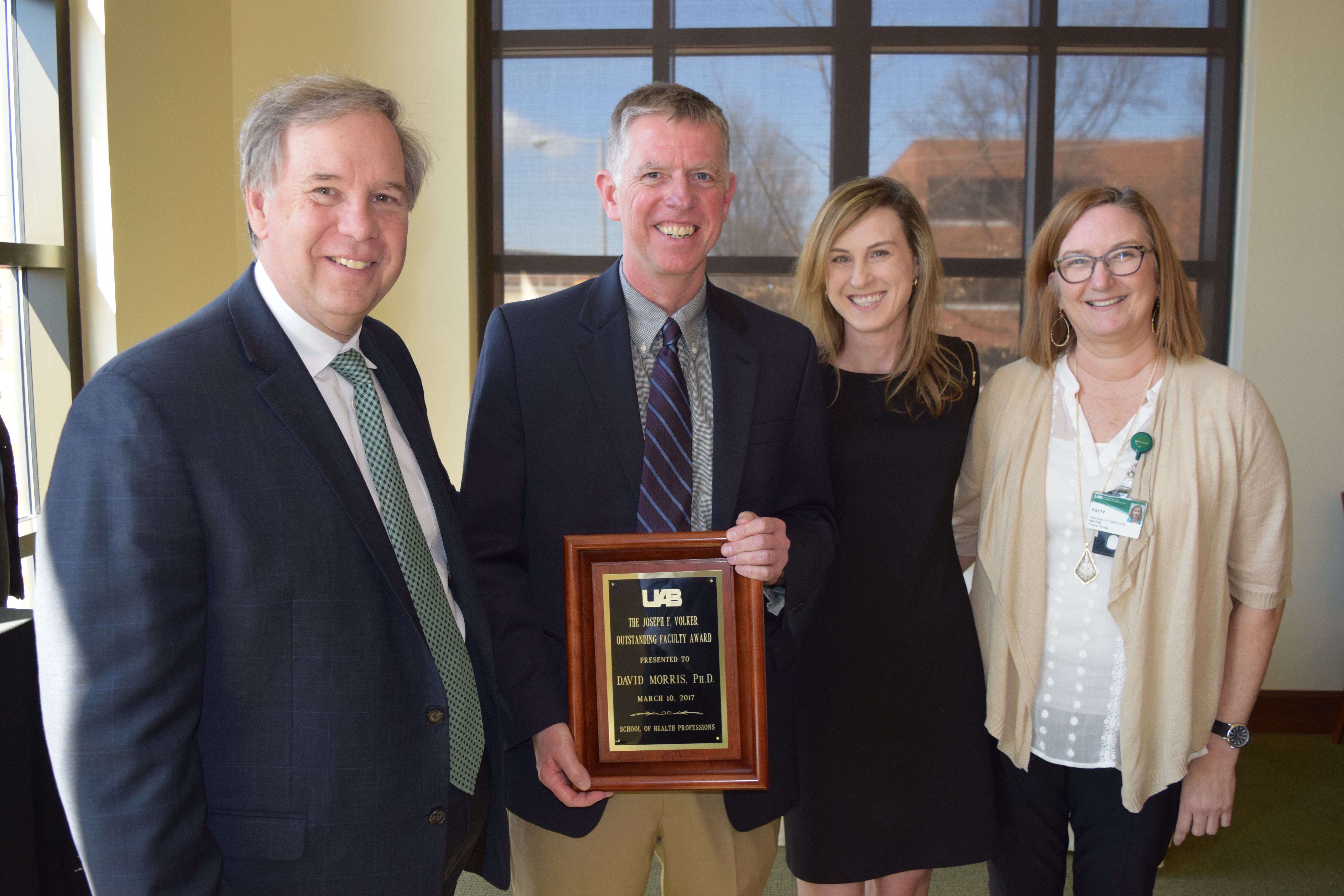Students/Faculty
Brenda Bertrand wins 2019 Outstanding Dietetics Educator Award
Brenda Bertrand, professor and director of the UAB School of Health Professions’ (SHP) M.S. in Nutrition Sciences program, is winner of the 2019 Outstanding Dietetics Educator Award from the Nutrition and Dietetic Educators and Preceptors (NDEP).
Read moreMeet PT Faculty Member Sheree York
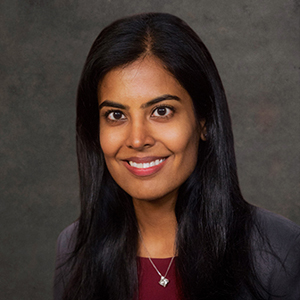
Monica Aswani research paper wins iHEA Student Prize
Monica S. Aswani, DrPH, assistant professor in the UAB School of Health Professions’ Department of Health Services Administration, wins the 2019 International Health Economics Association (iHEA) Student Prize for her paper titled “Differential Impact of Hospital and Community Factors on Medicare Readmission Penalties”.
Read more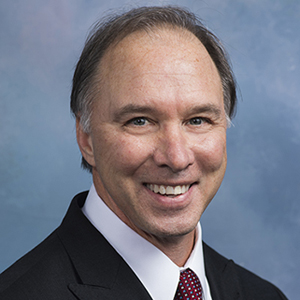
Butler named dean of UAB School of Health Professions
The University of Alabama at Birmingham has named Andrew J. Butler, MPT, MBA, Ph.D., dean of the UAB School of Health Professions following a national search.
Read more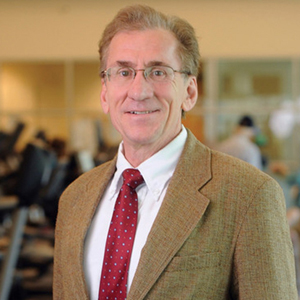
NIDILRR awards five-year grant to SHP team
Researchers at the UAB School of Health Professions have been awarded a five-year, $4.625 million grant from the National Institute on Disability, Independent Living and Rehabilitation Research to translate a novel exercise program, referred to as Movement-2-Music, into several community-based fitness centers in Birmingham.
Read more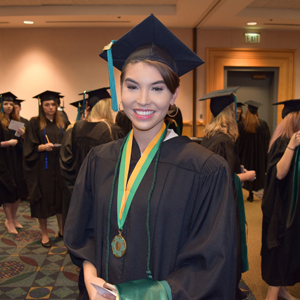
Asia Sullivan is first to graduate with dual MSPAS-MPH degree
Asia Sullivan, PA-S, is the first graduate of UAB’s M.S. in Physician Assistant Studies and M.S. Public Health dual degree program. The Castleberry, Alabama, native will participate in the School of Health Professions Graduate Professional Programs Hooding Ceremony and the UAB Graduate Commencement Ceremony on Friday, December 14, 2018.
Read more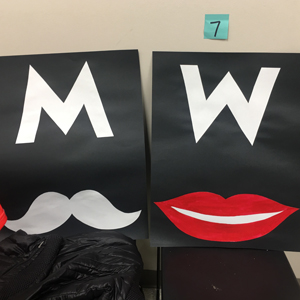
Occupational Therapy’s Golden Toilet Award goes too…
For the fourth year in a row, the UAB Department of Occupational Therapy handed out one of their most prized possessions – the infamous Golden Toilet Award. And the award goes too...
Read more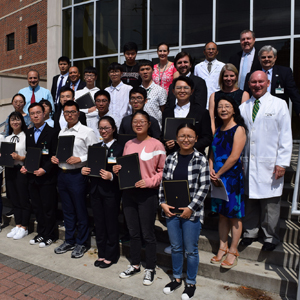
UAB Multidisciplinary Partnership Brings 21 Chinese Medical Students to the School of Health Professions
International Education at the University of Alabama at Birmingham, in conjunction with the School of Health Professions and INTO UAB hosted 21 medical students from China for a four-week immersion program into U.S. Culture and Medical Education. These students from the Wenzhou Medical University (Zhejiang province, China) graduated from the summer program on Friday, August 10, 2018.
Read more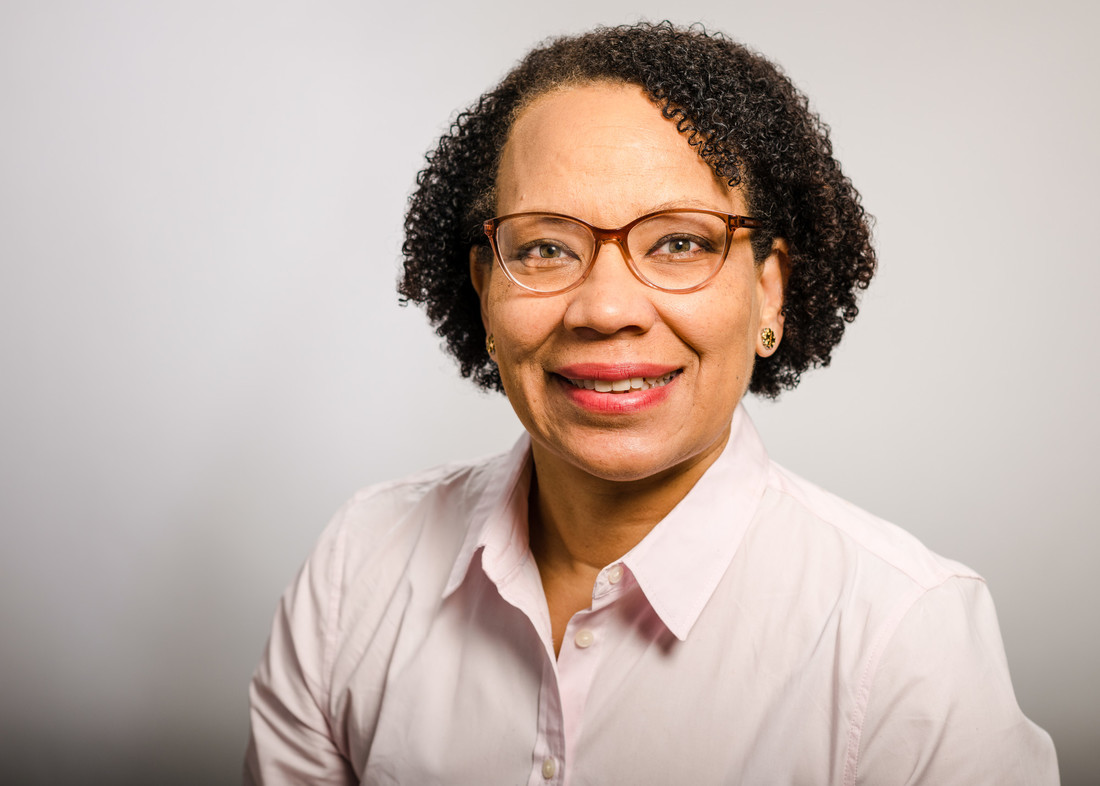
Allyson Hall named program director for graduate programs in Healthcare Quality & Safety
Allyson Hall, Ph.D., health policy professor in the Department of Health Services Administration has been named program director of the UAB Graduate Programs in Healthcare Quality and Safety.
Read more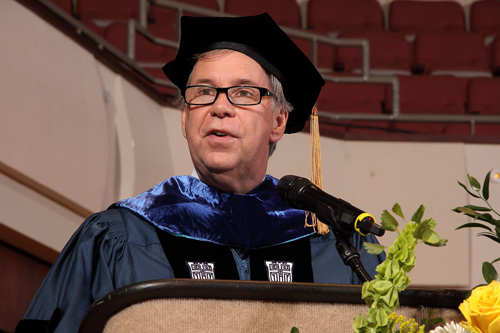
Harold Jones to step down after 17 years as dean of Health Professions
Harold Jones, Ph.D., dean of the School of Health Professions, has announced that he will be stepping down from his role as dean, pending arrival of his successor. Jones became dean of what then was known as the School of Health-Related Professions in April 2001, when it had a total of approximately 800 students. Today, it has more than 2,200 students.
Read more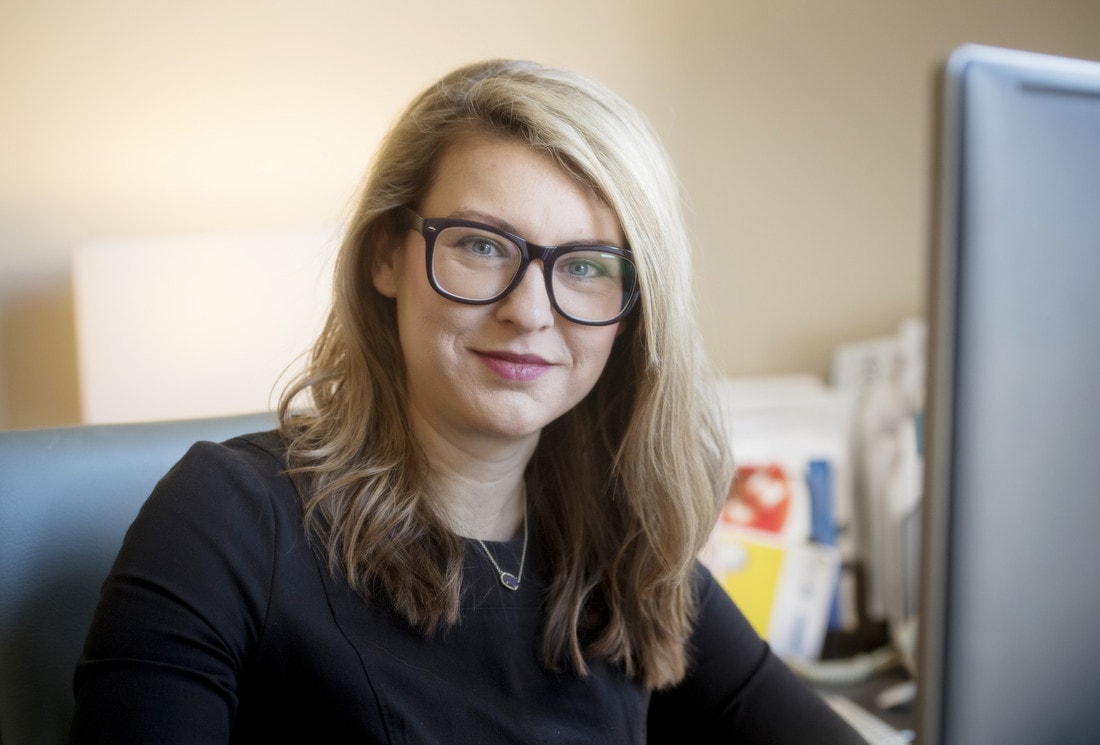
Goss wins Thrasher Research Fund Early Career Award
Amy Miskimon Goss, PhD, RD, postdoctoral fellow in the Nutrition Obesity Research Center (NORC) and Department of Nutrition Sciences, is the recipient of a Thrasher Research Fund Early Career Award.
Read more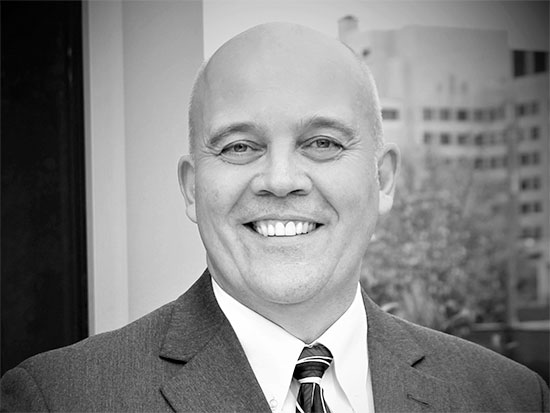
Jenkins named chair of Occupational Therapy
Gavin Jenkins, Ph.D., has been named chair of the UAB Department of Occupational Therapy. Jenkins, whose research interests include assistive technology, pedagogical affect, learning performance, and the influence of green spaces and built environment on occupational participation, has worked and researched in the United Arab Emirates, the United Kingdom and the United States.
Read moreNutrition Sciences’ Rivers named Recognized Young Dietitian of the Year
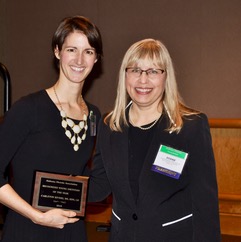 The Alabama Dietetic Association (ALDA), an affiliate of the Academy of Nutrition and Dietetics, has named Carleton Rivers, MS, RDN, program director of the UAB School of Health Professions’ Master of Science in Nutrition Sciences – Clinical Track – Dietetic Internship program, the Recognized Young Dietitian of the Year. Each year, affiliates of the Academy name a Recognized Young Dietitian to recognize the excellence of dietitians age 35 or younger.
The Alabama Dietetic Association (ALDA), an affiliate of the Academy of Nutrition and Dietetics, has named Carleton Rivers, MS, RDN, program director of the UAB School of Health Professions’ Master of Science in Nutrition Sciences – Clinical Track – Dietetic Internship program, the Recognized Young Dietitian of the Year. Each year, affiliates of the Academy name a Recognized Young Dietitian to recognize the excellence of dietitians age 35 or younger.
OT’s Valley McCurry wins ALOTA Cosby Award
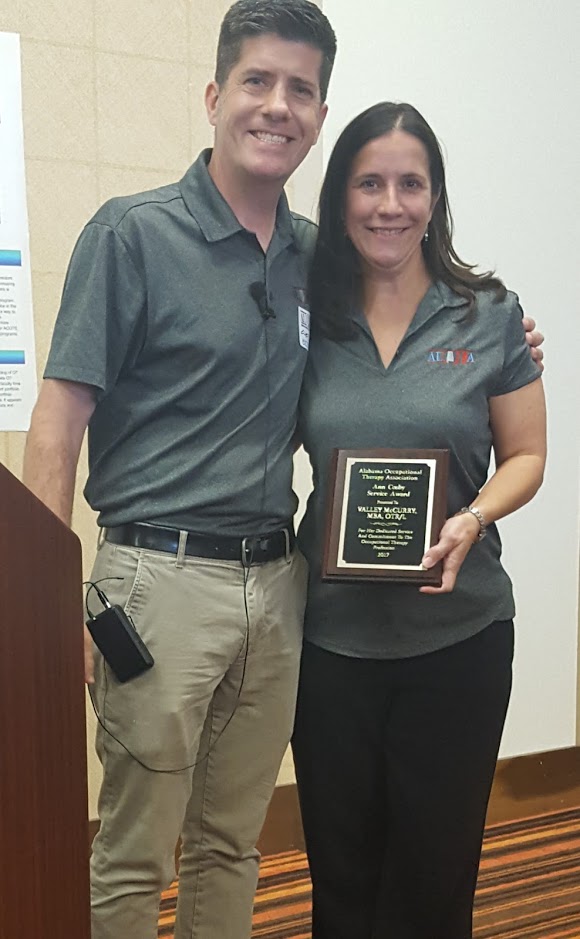 Chris Eidson and Valley McCurryValley McCurry, MBA, OTR/L, assistant professor in the UAB School of Health Professions’ Department of Occupational Therapy, received the Ann Cosby Service Award from the Alabama Occupational Therapy Association (ALOTA).
Read more
Chris Eidson and Valley McCurryValley McCurry, MBA, OTR/L, assistant professor in the UAB School of Health Professions’ Department of Occupational Therapy, received the Ann Cosby Service Award from the Alabama Occupational Therapy Association (ALOTA).
Read more
UAB OT students learn therapy tricks from illusionist Kevin Spencer
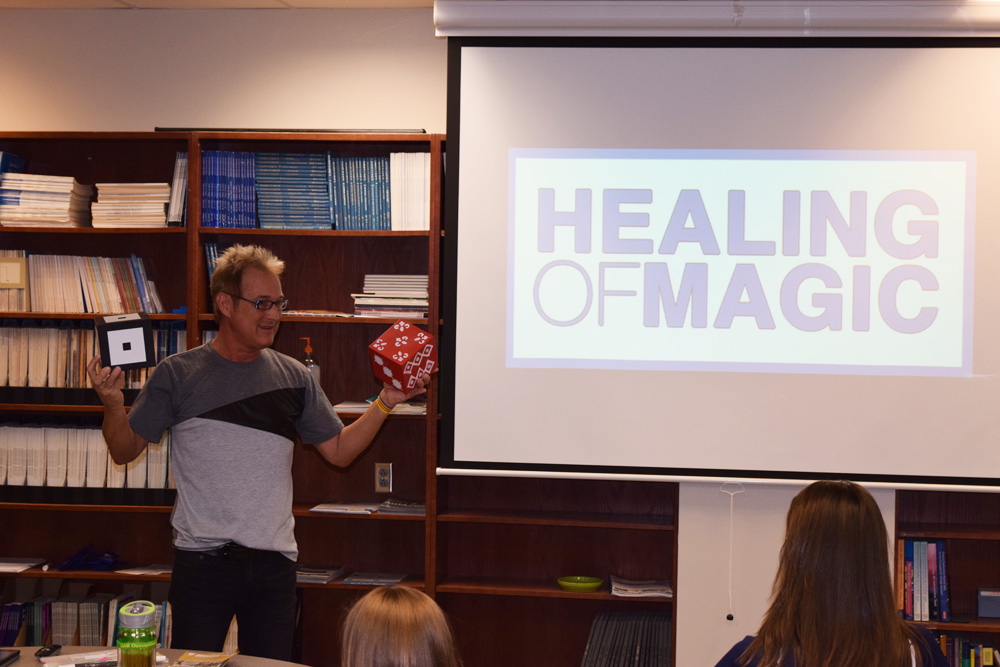 Kevin Spencer is an illusionist and artist who has performed magic in front of tens of thousands of people on stages in 34 countries on six continents.
Kevin Spencer is an illusionist and artist who has performed magic in front of tens of thousands of people on stages in 34 countries on six continents.A day ahead of performing his “Theatre of Illusion” at the UAB Alys Stephens Center, he delivered a performance in front of a crowd of only 50, but it was a performance that has the potential to impact tens of thousands of people around the world. Read more
NMT’s Krystle Glasgow earns SECSNMMI-TS Distinguished Service award
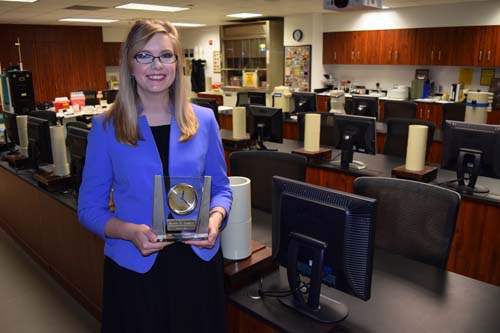 Glasgow with Distinguished Service AwardKrystle Glasgow, MIS, CNMT, NMTCB (CT), NMAA, clinical coordinator and teacher in the UAB School of Health Professions’ Master of Science in Nuclear Medicine Technology program, received the Southeastern Chapter of the Society of Nuclear Medicine and Molecular Imaging – Technologist Section (SECSNMMI-TS) 2017 Distinguished Service honor. This is not an annual award – it is only delivered when the chapter president wishes to honor an individual for above and beyond service to the Nuclear Medicine Technology profession and the society.
Read more
Glasgow with Distinguished Service AwardKrystle Glasgow, MIS, CNMT, NMTCB (CT), NMAA, clinical coordinator and teacher in the UAB School of Health Professions’ Master of Science in Nuclear Medicine Technology program, received the Southeastern Chapter of the Society of Nuclear Medicine and Molecular Imaging – Technologist Section (SECSNMMI-TS) 2017 Distinguished Service honor. This is not an annual award – it is only delivered when the chapter president wishes to honor an individual for above and beyond service to the Nuclear Medicine Technology profession and the society.
Read more
PCORI awards $5.7 million for study on exercise delivery in people with multiple sclerosis
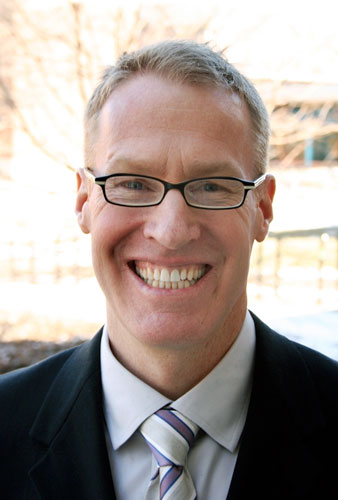 Robert Motl, Ph.D., a professor in the School of Health Professions, developed the exercise program used in the study.Story by Bob Shepard, UAB News
Robert Motl, Ph.D., a professor in the School of Health Professions, developed the exercise program used in the study.Story by Bob Shepard, UAB News
Researchers studying methods of exercise delivery and the effects on people living with multiple sclerosis have been awarded $5.7 million in funding by the Patient-Centered Outcomes Research Institute (PCORI).
UAB / Lakeshore Research Collaborative awarded $5.8M for MS research
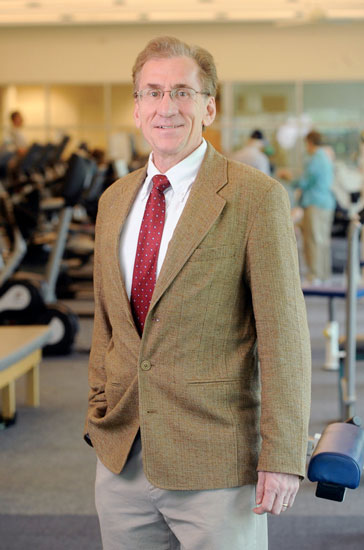 James Rimmer, Ph.D.The Patient-Centered Outcomes Research Institute (PCORI) Board of Governors has approved a $5.8 million grant over the next four years to the University of Alabama at Birmingham School of Health Professions’ James Rimmer, Ph.D., to fund a study to determine whether people with multiple sclerosis get as much benefit from an exercise-based rehabilitation program delivered via internet and telephone as they do when the therapy is provided in a clinic.
James Rimmer, Ph.D.The Patient-Centered Outcomes Research Institute (PCORI) Board of Governors has approved a $5.8 million grant over the next four years to the University of Alabama at Birmingham School of Health Professions’ James Rimmer, Ph.D., to fund a study to determine whether people with multiple sclerosis get as much benefit from an exercise-based rehabilitation program delivered via internet and telephone as they do when the therapy is provided in a clinic.
AHA awards UAB a $3.7 million grant to further generational obesity research
 Top, from left: The UAB Strategically Focused Research Center team includes: Kirk Habegger, Ph.D.; Nefertiti Durant, M.D.; Tim Garvey, M.D.; David Allison, Ph.D.; Stella Aslibekyan, Ph.D.; Nengjun Yi, Ph.D.; Cora Elizabeth Lewis, M.D.; Paula Chandler-Laney, Ph.D.; Bertha Hidalgo, Ph.D.; Lorie Harper, M.D.The University of Alabama at Birmingham will launch the UAB Strategically Focused Obesity Research Center with a grant from the American Heart Association for $3.7 million over the next four years. The UAB SFOC is one of four sites in the AHA’s Strategically Focused Obesity Research Network that will work together to advance the field of obesity research.
Read more
Top, from left: The UAB Strategically Focused Research Center team includes: Kirk Habegger, Ph.D.; Nefertiti Durant, M.D.; Tim Garvey, M.D.; David Allison, Ph.D.; Stella Aslibekyan, Ph.D.; Nengjun Yi, Ph.D.; Cora Elizabeth Lewis, M.D.; Paula Chandler-Laney, Ph.D.; Bertha Hidalgo, Ph.D.; Lorie Harper, M.D.The University of Alabama at Birmingham will launch the UAB Strategically Focused Obesity Research Center with a grant from the American Heart Association for $3.7 million over the next four years. The UAB SFOC is one of four sites in the AHA’s Strategically Focused Obesity Research Network that will work together to advance the field of obesity research.
Read more
